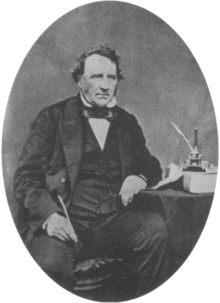Charles Pearson
| Charles Pearson | |
|---|---|

Charles Pearson, circa 1855
|
|
| Born |
4 October 1793 City of London, United Kingdom |
| Died | 14 September 1862 (aged 68) Wandsworth |
| Occupation | Solicitor Member of Parliament |
| Known for | Transport campaigner |
| Title | City Solicitor |
| Term | 1839–1862 |
| Spouse(s) | Mary Dutton (1817-1862) |
|
|
|
Charles Pearson (4 October 1793 – 14 September 1862) was Solicitor to the City of London, a reforming campaigner, and – briefly – Member of Parliament for Lambeth. He campaigned against corruption in jury selection, for penal reform, for the abolition of capital punishment, and for universal suffrage.
Pearson used his influence as City Solicitor to promote improvements to transport communications. Initially, he proposed a central railway station for the City, accessed by tunnel, that would be used by multiple railway companies enabling workers to commute to the City from further away. When this plan was rejected, Pearson promoted an underground railway connecting the capital's northern termini. The resulting Metropolitan Railway was the first underground railway in the world and led to the development of the extensive London Underground network and the rapid expansion of the capital.
Pearson was born on 4 October 1793 at 25 Clement's Lane in the City of London, the son of Thomas Pearson, an upholsterer and feather merchant, and his wife Sarah. After education in Eastbourne, he was apprenticed to his father but instead studied law and qualified as a solicitor in 1816. In 1817, he was released from his indenture by the Haberdashers' Company and married Mary Martha Dutton. The couple had one child, Mary Dutton Pearson, born in 1820.
In 1817, Pearson was elected a councilman of the City of London Corporation for Bishopsgate ward and served in that role from 1817 to 1820 and from 1830 to 1836 as well. He served as chairman of the City board of health from 1831 to 1833. In 1839, he gave up his extensive private practice and was appointed City Solicitor, holding that office until his death.
...
Wikipedia
